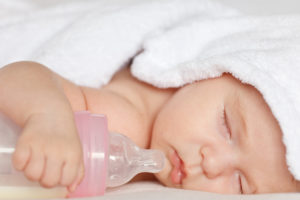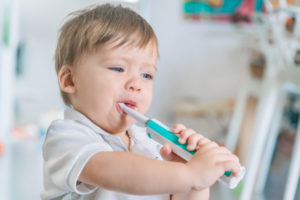Even though your baby might have only one tooth (or still no teeth yet), it’s not too early to start taking care of them. Gum disease and tooth decay in babies can lead to other problems, some lasting long enough to affect adult teeth when they come in. If infants or toddlers experience tooth decay or mouth infections or lose baby teeth too early, they might have speech difficulties or trouble eating a balanced diet. They can also be at higher risk for crooked adult teeth or further tooth decay later in life.
Extreme cases like these don’t happen very often, but here’s what you can do to ensure your baby won’t have an increased risk of these unfavorable side effects.
1. Only use bottles for specific liquids.
Baby bottles (not sippy cups) are meant only for infant’s milk, formula, water, or the occasional electrolyte drink that your pediatrician may recommend. That’s it. You should never put juice, soda, sugar water, or any other drink in a baby bottle before giving it to your baby. Once your baby begins drinking those other liquids, your baby is ready for more mature sippy cups. You can continue to give breast milk, formula, or water in bottles.
2. Don’t let your baby sleep with a bottle.
We know it’s tempting to help soothe your baby to sleep with a bottle, but it only creates problems when your baby consistently sleeps with a bottle full of milk or formula. The sugar and other bacteria that form in the baby’s mouth will sit there all night and infect the gums and teeth. Saliva production decreases at night, so bacteria will only grow more rapidly. If you’re desperate, you could let your baby have some lukewarm water in the bottle only. Water will not do damage.
3. Clean your baby’s mouth after giving a bottle.
If your baby doesn’t have teeth yet, that doesn’t mean you should ignore the prospect of future baby teeth. Gently wash his or her gums using just your finger and a bit of water after giving a bottle. Another bonus to doing this is that the gentle finger or washcloth massage can help soothe a baby who may be cutting their first teeth. You can take the opportunity to feel for new teeth just breaking the surface.
 4. Brush from the very first tooth.
4. Brush from the very first tooth.
Once your baby has his or her first tooth, you can begin using a toothbrush with just a little water and no toothpaste. Continue to use your finger along the gum areas without teeth. It is most important to clean the teeth before bed due to the reduced amount of saliva in the mouth while sleeping.
5. Begin flossing early.
Similarly, you can begin flossing earlier than you might think. Once all of the baby teeth have come in, you should begin a daily routine of flossing before bed. Most children are too young to brush and floss adequately by themselves by the time their teeth are in, so it’s up to the parents to do a thorough job. Get into this habit before you see the dentist and your child’s dental visits will go much smoother!
6. Use an appropriate pacifier and keep it clean.
Pacifiers are another great way to soothe your baby and help promote proper tooth and gum development. Just don’t misuse them. Some parents are tempted to put sugar or other sweet substances on the binky to help soothe a colicky baby, but this is extremely detrimental to the teeth. Ask your pediatrician about other ways to calm a fussy baby. Also, be aware of when it is appropriate for your child to stop sucking on a binky as this can cause other issues with growing teeth.
7. Get enough fluoride.
Both children and adults need fluoride to help protect their teeth. As a result, most cities have water treatment systems in place that add the right amount of fluoride to your home’s drinking water. If your drinking water has been treated with fluoride, then you do not need to worry about getting more. If not, ask your dentist about fluoride toothpastes or supplements that would be appropriate for your child.
8. Schedule your child’s dental visit by age 1.
 Dentists and pediatricians recommend that your child see a dentist before or right around the time they turn 1 year old. Most babies will have cut some teeth by this time, so you should have already started a brushing routine. If so, your little tike will feel more comfortable having a dentist look at their teeth. However, at this first visit, most dentists won’t do much more than simply look at the teeth to ascertain whether there is any tooth decay. They may do some basic cleaning, but the goal is to give a positive first experience.
Dentists and pediatricians recommend that your child see a dentist before or right around the time they turn 1 year old. Most babies will have cut some teeth by this time, so you should have already started a brushing routine. If so, your little tike will feel more comfortable having a dentist look at their teeth. However, at this first visit, most dentists won’t do much more than simply look at the teeth to ascertain whether there is any tooth decay. They may do some basic cleaning, but the goal is to give a positive first experience.
These tips will certainly help ensure that your precious little one does not experience uncomfortable tooth decay early in life! You can help set the expectation and the great habits of brushing and flossing by following these steps with your baby from the beginning. We look forward to seeing you and helping everyone in your family to have beautiful, healthy teeth!


